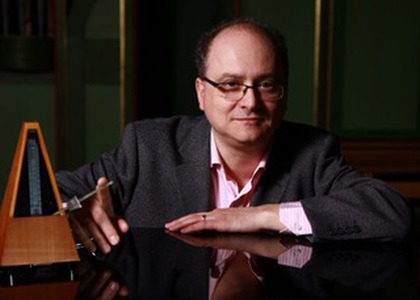> [Archived] Interviews

Interviewing composer Dan Dediu
How will you endeavor to tackle the question "What impact does classical music have on our minds?" - the theme of the conference taking place at the New Europe College?
I've asked this question myself regarding the issue of focused listening and I've tried to give three answers for which I will bring arguments, and I will also show it through various musical works that I will bring into discussion. I will discuss the traditional classical music in particular, starting with Mozart and ending with Debussy, with the purpose of bringing in an audience of music lovers - students, researchers, intellectuals - who listen to music. I would like to offer them the opportunity of being guided into an audition.
Should we expect a "surprise element" about the chosen topic?
I think we should. I'm ready to give a few demonstrations, which I'd say haven't been shown in this format before. My first proposal is that what music does - in its complete version, without program or text - is summarize on a small scale historical processes which happen on a large scale. Therefore, if we notice a certain path of a historical process which takes place over a period of 30 years, I can explain to them that the same process happens in a sonata composed by Beethoven in 3 minutes. So this would be one of the arguments.
The second argument of the conference is that focused listening is done in first person. When we, all of us, listen to music, we are heroes of that adventure, we put ourselves in the shoes of the red thread and we become, as a matter of fact, main characters. That means that we actually are what we listen to, we listen based on the experience we have; I can explain more indeed on this topic. There are people who do not understand a certain music genre also due to having a certain mindset, educational background, but those who manage to cross that limit and try to educate themselves on a type of music less known, they manage to do so and go on that line. Therefore, it is all in our head, as a matter of fact, within our control; making this a spiritual experience which enriches our souls is up to us.
Translated by Denisa Stanciu,
University of Bucharest, Faculty of Foreign Languages and Literatures, MTTLC, year I
Corrected by Silvia Petrescu














